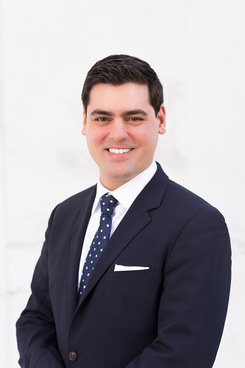First a Nightmare, Then Nearly $13M for a Miami Law Firm Targeted by Fraudsters
Aballi Milne Kalil's phone number was used in approximately 100,000 calls to unsuspecting Miami-Dade residents to inquire about insurance packages. Now, through the efforts of attorney Matthew Deblinger, the firm has secured approximately $13 million in damages against the perpetrators.
November 08, 2018 at 03:42 PM
5 minute read
 Photo: Shutterstock
Photo: Shutterstock
Litigator Matthew Deblinger had been handed a seemingly impossible undertaking: Track down the parties responsible for spoofing his law firm's phone number in hundreds of thousands of telemarketing calls selling insurance to unsuspecting Miami-Dade residents.
Spoofing is a process by which fraudsters mask their identity to make it appear as if their communication is coming from another source. In this case, international con artists used the law firm's number to contact elderly targets and gather personal information to generate insurance sales.
“There were dozens of calls a minute,” Deblinger said. “It started with our phones ringing off the hook. We had no idea what was happening. Residents and business would say they had a missed call from our number. It was really a disruption to our business.”
The stakes were especially high for Deblinger, who joined Aballi Milne Kalil as an associate in September 2016, and was tasked by one of the firm's partners, Craig Kalil, with restoring order. The law office that had become inundated with messages from confused callers around the same time he had started.
“We decided the only way to track down the phone spoofer was to file a lawsuit,” Deblinger recounted. The alternative — changing the phone number the international law firm had used for 25 years — was deemed unthinkable.
More than a year after filing an initial John Doe lawsuit in February 2017, Deblinger and his colleagues achieved two major victories.
First, despite the odds, he managed to identify the parties at fault — South African company Sidqcon Pty Ltd. and its phone provider, Delaware-based Telcast LLC and Telcast Networks LLC.
Then, in a later feat, he secured a $12,790,800 judgment against them before Miami-Dade Circuit Judge Reemberto Diaz.
Read the motion for summary judgment:
'No One Knew How to Catch These Guys'
Immediately after filing suit, Deblinger and several of the firm's employees began investigating the source of their office's woes. As the attorney sought help from telecom companies, the firm's staff “spent entire days” fielding calls, juggling between irritated call recipients and actual clients.
The effort to track the spoofers spanned months, from February through July 2017.
 Matthew Deblinger, of Aballi Milne Kalil.
Matthew Deblinger, of Aballi Milne Kalil.“The hours were extensive,” said Deblinger, who had to forego billable hours for talks with phone companies and callers who'd been contacted by fraudsters using the firm's number. “I wasn't limited on the budget that I could expend in this case. We knew there was a learning curve involved to figure out how to track the spoofer, and the managing partner gave me carte blanche to get the result we wanted.”
Although he would not divulge the cost of their efforts, Deblinger said much of the time was spent conducting discovery and subpoenaing phone providers for their call records.
“We didn't know we were going to find them,” he confessed. “Providers told us they'd hit a dead end as well. Verizon, AT&T, no one knew how to catch these guys.”
But after seven months spent reverse tracing phone calls and contacting an array of small and large phone providers alike, Deblinger and his colleagues had a major breakthrough: They learned in July 2017 that the calls had been facilitated by Telcast.
“[Telcast] came back to us and said, 'Our client's the phone spoofer. We'll tell them to stop,'” Deblinger said.
How The Scam Worked
Although the company apologized for the problems, Deblinger demanded that Telcast hand over their records, which showed the firm's phone number had been spoofed more than 10,000 times in three months.
The records helped Deblinger determine that the phone spoofer, Sidqcon, operates as a lead generator for insurance companies in the U.S. The calls usually target the elderly.
“The [Sidqcon employee] will pitch them different insurance packages to see if the person is interested,” Deblinger explained. ”If the elderly person says, 'That sounds interesting,' [Sidqcon] will take down any info they can and sell that info to insurance companies. It appears that they called about a million people a week in the U.S.”
After amending its complaint to name Telcast and Sidqcon, the firm filed a motion for summary judgment, which the judge granted.
Diaz's order granted the full amount requested by the firm — $10,659,000 against Sidqcon for violations of the Florida Telemarketing Act and $2,131,800 against the defendants for tortious interference with business relationships.
Sidqcon and Telcast did not retain counsel in response to AMK's complaint.
Read the final judgment:
“We don't know the extent of the damage to our reputation,” Deblinger said. “If you Googled our number it'd show somebody reported it as a scam number.”
Nonetheless, Deblinger is happy to see the issue resolved and remains confident in AMK's ability to collect on the award.
“We believe this sends a strong message to phone spoofers,” he said. “It needs to stop.”
Sidqcon and Telcast representatives did not respond to requests for comment by press time.
Related stories:
Putative Class Action Over Hospital Robocalls Allowed to Proceed
This content has been archived. It is available through our partners, LexisNexis® and Bloomberg Law.
To view this content, please continue to their sites.
Not a Lexis Subscriber?
Subscribe Now
Not a Bloomberg Law Subscriber?
Subscribe Now
NOT FOR REPRINT
© 2025 ALM Global, LLC, All Rights Reserved. Request academic re-use from www.copyright.com. All other uses, submit a request to [email protected]. For more information visit Asset & Logo Licensing.
You Might Like
View All


U.S. Eleventh Circuit Remands Helms-Burton Trafficking Case Involving Confiscated Cuban Port
3 minute read
Miami Lawyer Guilty of Indirect Criminal Contempt But Dodges Paying Legal Fees
4 minute readTrending Stories
- 1'It's Not Going to Be Pretty': PayPal, Capital One Face Novel Class Actions Over 'Poaching' Commissions Owed Influencers
- 211th Circuit Rejects Trump's Emergency Request as DOJ Prepares to Release Special Counsel's Final Report
- 3Supreme Court Takes Up Challenge to ACA Task Force
- 4'Tragedy of Unspeakable Proportions:' Could Edison, DWP, Face Lawsuits Over LA Wildfires?
- 5Meta Pulls Plug on DEI Programs
Who Got The Work
Michael G. Bongiorno, Andrew Scott Dulberg and Elizabeth E. Driscoll from Wilmer Cutler Pickering Hale and Dorr have stepped in to represent Symbotic Inc., an A.I.-enabled technology platform that focuses on increasing supply chain efficiency, and other defendants in a pending shareholder derivative lawsuit. The case, filed Oct. 2 in Massachusetts District Court by the Brown Law Firm on behalf of Stephen Austen, accuses certain officers and directors of misleading investors in regard to Symbotic's potential for margin growth by failing to disclose that the company was not equipped to timely deploy its systems or manage expenses through project delays. The case, assigned to U.S. District Judge Nathaniel M. Gorton, is 1:24-cv-12522, Austen v. Cohen et al.
Who Got The Work
Edmund Polubinski and Marie Killmond of Davis Polk & Wardwell have entered appearances for data platform software development company MongoDB and other defendants in a pending shareholder derivative lawsuit. The action, filed Oct. 7 in New York Southern District Court by the Brown Law Firm, accuses the company's directors and/or officers of falsely expressing confidence in the company’s restructuring of its sales incentive plan and downplaying the severity of decreases in its upfront commitments. The case is 1:24-cv-07594, Roy v. Ittycheria et al.
Who Got The Work
Amy O. Bruchs and Kurt F. Ellison of Michael Best & Friedrich have entered appearances for Epic Systems Corp. in a pending employment discrimination lawsuit. The suit was filed Sept. 7 in Wisconsin Western District Court by Levine Eisberner LLC and Siri & Glimstad on behalf of a project manager who claims that he was wrongfully terminated after applying for a religious exemption to the defendant's COVID-19 vaccine mandate. The case, assigned to U.S. Magistrate Judge Anita Marie Boor, is 3:24-cv-00630, Secker, Nathan v. Epic Systems Corporation.
Who Got The Work
David X. Sullivan, Thomas J. Finn and Gregory A. Hall from McCarter & English have entered appearances for Sunrun Installation Services in a pending civil rights lawsuit. The complaint was filed Sept. 4 in Connecticut District Court by attorney Robert M. Berke on behalf of former employee George Edward Steins, who was arrested and charged with employing an unregistered home improvement salesperson. The complaint alleges that had Sunrun informed the Connecticut Department of Consumer Protection that the plaintiff's employment had ended in 2017 and that he no longer held Sunrun's home improvement contractor license, he would not have been hit with charges, which were dismissed in May 2024. The case, assigned to U.S. District Judge Jeffrey A. Meyer, is 3:24-cv-01423, Steins v. Sunrun, Inc. et al.
Who Got The Work
Greenberg Traurig shareholder Joshua L. Raskin has entered an appearance for boohoo.com UK Ltd. in a pending patent infringement lawsuit. The suit, filed Sept. 3 in Texas Eastern District Court by Rozier Hardt McDonough on behalf of Alto Dynamics, asserts five patents related to an online shopping platform. The case, assigned to U.S. District Judge Rodney Gilstrap, is 2:24-cv-00719, Alto Dynamics, LLC v. boohoo.com UK Limited.
Featured Firms
Law Offices of Gary Martin Hays & Associates, P.C.
(470) 294-1674
Law Offices of Mark E. Salomone
(857) 444-6468
Smith & Hassler
(713) 739-1250






